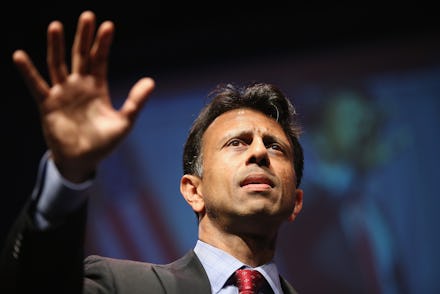Bobby Jindal’s Support for "Religious Freedom" Only Applies to People He Likes

Louisiana Gov. Bobby Jindal is an ardent believer in religious liberty — and he'll be the first to tell you so.
In February, the two-term governor and current presidential candidate gave a barn-burning speech at the Ronald Reagan Presidential Foundation and Library, declaring that Americans are "mired in a silent war" against religious freedom. Speaking in April in support of a proposed Religious Freedom Restoration Act, which allows business owners to discriminate against LGBT patrons if they cite their religious faith, Jindal declared that "America did not create religious liberty — religious liberty created America." While defending a soon-to-fail bill that would forbid state agencies from punishing individuals, businesses and nonprofits for denying service to LGBT people, Jindal declared that "the great thing in America is that we support the right of folks to live their lives according to their beliefs, whether we agree with them or not."
So why is the governor threatening a church with arrest if they participate in a protest in Louisiana?
Because the protesters in question belong to the notorious Westboro Baptist Church. In what could be the most depressing face-off since AVP: Alien vs. Predator (tagline: "Whoever wins... we lose"), the infamous Kansas-based church has vowed to picket the funerals of Mayci Breaux and Jillian Johnson, both of whom were killed in a mass shooting in a Lafayette, Louisiana, movie theater last week.
In response to the promised protest, Jindal has vowed to arrest any and all Westboro members who picket the funerals. "Let me be very clear," the governor declared on the CBS Sunday morning political program Face the Nation. "If they come here to Louisiana, if they try to disrupt those funerals, we're going to lock them up. We're going to arrest them."
The church, deemed "the most obnoxious and rabid hate group in America" by the Southern Poverty Law Center, frequently protests the funerals of celebrities, crime victims and veterans to decry what it believes is the U.S. government's endorsement of homosexuality.
John Russell Houser, who opened fire inside a movie theater during a showing of Trainwreck before committing suicide, had praised the Westboro Baptist Church on Twitter in the years before the shooting, calling it "the last real church in America."
Backing up his threat, Jindal issued an executive order ordering Louisiana State Police to strictly enforce state laws that prevent protesters from interfering with funerals. State law in Louisiana requires that demonstrations stay up to 500 feet away from funeral processions until two hours after their conclusion. Protesters are additionally banned from blocking or interfering with funeral routes.
"We're going to arrest them. They shouldn't try that in Louisiana. We won't abide by that here," Jindal declared on Face the Nation. "They better not try that nonsense here."
In short, Jindal, who refused to comply with a Supreme Court ruling that legalized same-sex marriage nationwide until three separate courts told him he had to, is condemning the most visible anti-gay organization in the country. Adding to the cast of strange bedfellows is a historically pro-LGBT group coming to the church's defense. The American Civil Liberties Union of Louisiana issued a statement calling Jindal's executive order "misguided," saying that it "has the potential to be used to infringe on protesters' First Amendment rights."
Legal precedent is on Westboro's side: In 2011, the U.S. Supreme Court issued a decision that explicitly deemed the church's protests as protected under the First Amendment.
"Religious freedom," in this case, is more of a guideline than a rule. Jindal's longstanding devotion to the idea that religious expression is paramount to American democracy is at odds with his desire to come down publicly on a widely unpopular group like Westboro. The governor, whose candidacy for the Republican presidential nomination is currently polling at roughly 1% among likely Republican voters, may see the Westboro protest as a chance to increase his national profile less than two weeks before the party's first presidential debate, but his strident condemnation of the church puts him at odds with his own rhetoric.
This isn't the first time Jindal's outspoken criticism of unpopular faith groups has come into direct conflict with his own self-professed devotion to the sacrosanct right of religious expression. In a speech given before a British neoconservative think-tank in January, Jindal warned that "non-assimilationist Muslims" who refuse to embrace the modern sensibilities and cultural norms of the Western countries to which they immigrate are a threat to democracy. According to Jindal, "it is completely reasonable" for nations to prevent an influx of religious minorities who want to "establish a separate culture within" their adopted homelands.
Yet in his commencement speech at Liberty University in May 2014, Jindal encouraged the evangelical Christian school's graduates to avoid assimilating into secular American culture. "Our religious liberty," he told the graduates, "must in no way ever be linked to the ever-changing opinions of the public."
Jindal's positions on religious liberty, then, seem only to apply to religions that he has deemed worthy of protection. For those who subscribe to faith traditions with little political capital or public support, Jindal's devotion to the First Amendment is absent.
After all, there aren't many votes to be won by protecting the rights of hatemongers to scream obscenities at grieving families — certainly not as many as can be won beating the dead horse of "traditional marriage." In the political calculus of the Republican primaries, Jindal has had to balance his longstanding support for religious expression with his desire to make it onstage in the party's first debate. For the Louisiana governor, backtracking on his signature issue the solution to that problem.